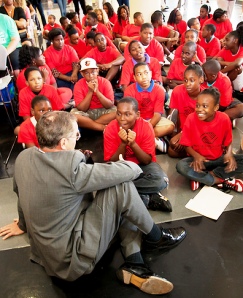How the Summer Months Can Give Low-Income Students An Edge
It’s been over a year since public schools in the Jacksonville area received a grant to boost summer learning programs.
Duval County was one of six districts around the country that caught the eye of the Wallace Foundation because of its already innovative forms of summer schooling – like the Superintendent’s Summer Academies.
The Wallace Foundation is a charity working to improve education and enrichment for disadvantaged children.
High on its priority list is combating the inevitable learning loss that takes place over the summer.
“This is where many children, especially low income children, forget a portion of what they learned during the prior school year over the summer break,” said Ann Stone, Senior Research and Evaluation Officer for the Wallace Foundation.
“Since this happens every summer, summer learning loss accumulates and ends up contributing substantially to the achievement gap that we see between low-income children and their more fortunate peers,” Stone said.
Wallace is partnering with six urban school districts over three years to learn if and how districts can provide summer programs that eliminate summer learning loss for a large numbers of students.
RAND researchers will track student progress in the summers of 2013 and 2014.
They’ll be looking for credible evidence that district summer programs can eliminate summer learning loss and produce academic gains that last.
Why Traditional Summer School Has an “Image Problem”
If the programs are successful, the Wallace Foundation would like to see summer learning become a core strategy for helping low income students excel academically.
For years, Stone says summer school has been seen as a place for kids who were failing certain subjects.
She says summer learning opportunities need to have a more positive image so kids will be excited to participate.
And that’s one of the goals of the Superintendent’s Summer Academies in Jacksonville.
The academies began four years ago, created with federal stimulus money that has since run out. The academies also operate under Title I funding – federal money for schools with high numbers of children from low-income families.
“Summer learning loss accumulates and ends up contributing substantially to the achievement gap that we see between low income children and their more fortunate peers.”
– Ann Stone, Senior Research and Evaluation Officer for the Wallace Foundation
While the academies accommodate students in Kindergarten through 12th grade, the Wallace funding is focused on K–5 students.
Now that the stimulus money has run out, the Wallace grant is not only keeping the academies open but also boosting enrichment activities.
Children spend their days working on regular curriculum infused with art, music, dance and field trips.
Children from the district’s turnaround schools are eligible to attend.
Turnaround schools are low-performing schools that received an F grade by the state or whose school performance dropped dramatically in certain areas.
The academies are free.
Transportation is provided. So are reading and math materials.
And students are given breakfast, lunch and afternoon snacks during the six week program.
Kathryn LeRoy, Chief Academic Officer for Duval County Public Schools, says it’s very different from traditional summer school.
“We do a lot of transitions during the day because we want to make sure that the children are engaged,” LeRoy said.
The Wallace Foundation is also funding the Jacksonville Children’s Commission, which is responsible for providing the enrichment activities at the eight schools that offer the academies.
Each school has an enrichment theme – like music or African dance. And students put on a show at the end of the six weeks.
The Superintendent’s Summer Academies in Jacksonville is in its fourth year. And in its second year of receiving the funding boost from Wallace.
“It’s really impacted the children in terms of more enrichment opportunities,” said LeRoy.
She says the summer months create an opportunity gap between children that live in poverty and those that don’t.
Through the academies, students “have opportunities to take field trips to various educational locations,” she said.
What Happens When the Wallace Foundation Grant Runs Out?
The Title I funding will still be in place, and growing national attention on summer learning may lead to more sources of money.
“The hope is that there will be additional federal funding or state funding,” LeRoy said.
“That there will be flexibility that we can extend this kind of work because it absolutely has an impact on student achievement.”
The Wallace Foundation’s Ann Stone says they want to know how effective two years of summer learning programs can be and how long the effects will last.
“We’re not expecting that there will be a huge influx of additional resources in public education that would fund summer programs. So it’s going to be a decision about resource allocation,” Stone said.
Next week, StateImpact Florida will examine summer reading loss and show how public libraries around the state are working to keep kids engaged in reading during the summer idle.


